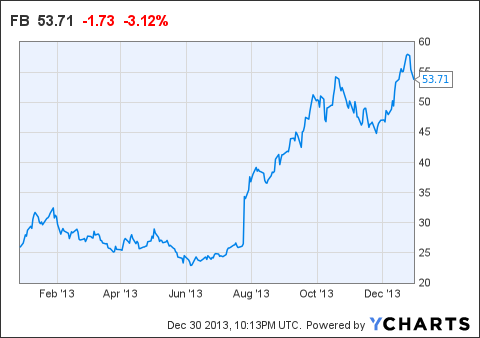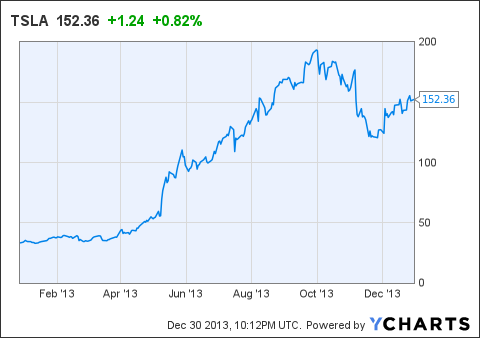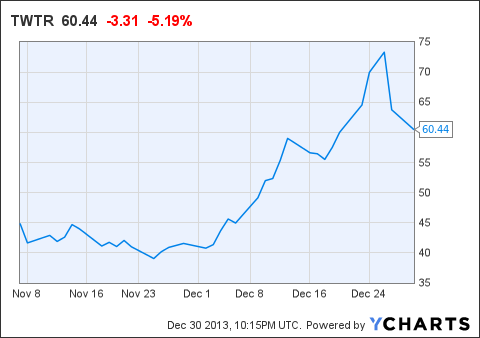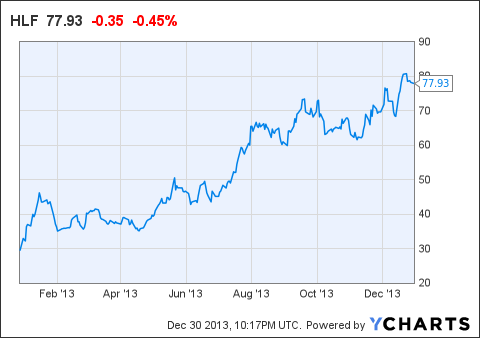As readers bask in the warm afterglow of Christmas and look forward to a happy and prosperous New Year, I'd like to throw a (half empty) glass of icy cold water in their faces.
Here are the stocks that are going to have a miserable next 12 months.
Out of the stocks I've picked for the 4 worst performing stocks in 2014, I would consider three of them bubbles and the other one is potentially in a worse situation than the other three.
Tesla (TSLA) has had a completely insane year; first its stock rose by nearly 500% on the back of massive short covering and a host of positive catalysts. These included a fivefold increase in the company's revenue, its first profitable quarter, and Car of the Year award for its Model S vehicle. The stock peaked at $193 making Tesla's market cap worth $24 billion. At which point it was worth more than several large established car manufacturers such as Fiat (OTCPK:FIATY), owner of Chrysler, and nearly half as much as Ford (F) and GM (GM).
In the last few months the stock has gyrated wildly, dropping from $193 to $120 and then back to $150. On the way down to $120 it seemed as if Tesla's bubble had finally burst amid a flurry of negative press reports about everything from Tesla's cars catching fire, concerns that it wouldn't have enough batteries, to the CEO talking down the stock. After the National Highway Traffic Safety Administration reaffirmed Tesla's five stars rating, the stock popped back up.
On any reasonable valuation basis this stock is massively overvalued. Tesla has a price to book ratio of 34, a price to sales ratio of 11 and a forward price to earnings ratio of 135. My fair value price for Tesla is 2x sales or around $30 per share. This is similar to other luxury car makers that can command high gross margins.
In my view the only thing that is currently sustaining the elevated stock price is the high short interest in Tesla's stock. The latest figures indicate that 36% of the stock's free float has been shorted. Because this stock attracts so many shorts it's quite difficult to predict exactly when the stock price will collapse. But I suspect that as it becomes apparent in the next 12 months that Tesla will not be launching its Model E mainstream electric vehicle any time soon, expectations for Tesla's revenue growth will be ratcheted down.
My next stock is Facebook (FB).

I've written before about how this stock is discounting far too much revenue growth. Revenue growth this year is on track for a very impressive 60% year over year, which has reversed the trend of decelerating revenue growth in the years before 2013. However this has been achieved by Facebook finally monetizing mobile users, a resource that can only be tapped once.
I expect revenue growth to fall below 20% next year, compared to consensus forecasts of nearly 30%. In 2015 I expect only 10% revenue growth, after which I actually expect revenue growth to come to complete stand still. Thus Facebook's annual revenue will never exceed $10 billion - a far cry from the likes of Google (GOOG), which generates $50 billion dollars of advertising revenue per year.
Because of the sharp revenue deceleration Facebook will experience next year, starting as early as the first quarter of 2014, investors in Facebook are going to be in for a rude shock: a company growing revenue at 60% a year commands a premium quite different to one growing at 20% a year and falling. Therefore I expect Facebook's stock price at the end of 2014 to be quite near to my fair value target of $12.
Twitter (TWTR) is already considered by almost everyone (with the possible exception of Twitter investors) to be a bubble stock, so no surprise that it makes this list.
The significance of this stock for the overall market is that it marks the return of dot com style valuations to IPO's. Twitter isn't profitable, unlike Facebook when it went public, and has implausibly high valuation metrics. So much so that there is little point in comparing Twitter to other expensive stocks today - Twitter's valuation is off the charts compared to them - instead I'm forced to compare Twitter to some former high flying dot com stocks to see how Twitter measures up.
Metric | AOL (AOL) | Yahoo (YHOO) | Priceline (PCLN) | Amazon (AMZN) | |
Sales | $500 million | $4.8 billion | $1 billion | $1.25 billion | $2.75 billion |
Market Cap | $33 billion | $163 billion | $110 billion | $10 billion | $25 billion |
P/S | 66 | 34 | 110 | 8 | 9 |
I've used the price to sales ratio since in most cases these dot com stocks didn't have any earnings. Except for Twitter, figures are from the year 2000.
I haven't included obvious no-hopers like pet.com etc which went out of business. All the stocks on the list are ones that have survived; these include stocks that have roared back and are now considered massive turnaround success stories. Twitter on a price to revenue basis is more expensive than all except from Yahoo, and Yahoo hasn't been able to grow into its valuation.
Only Priceline and Amazon have managed to exceed their 2000 market caps and they started with relatively reasonable price to sales ratios. If Amazon had started in 2000 with a price to sales ratio of 66 like Twitter does now, rather than its actual price to sales of 9, then its market cap would have been $181.5 billion or only slightly higher than its current market cap of $180 billion. However, when you take stock dilution into account Amazon's stock price has only increased by a factor of 6.1, which implies a $153 billion market cap. Moreover investors want to generate a return on their investment of at least 10-12 percent per year, which means that Amazon's market cap would need to have risen to $581 billion.
Are they any catalysts that can bring Twitter's valuation down to earth in the next 12 months? As far as Twitter's business fundamentals go, perhaps not. But Twitter's upcoming secondary stock offering may provide just such a negative catalyst. Remember that before Twitter went public, it was valued by management at only $10 billion, so insiders are likely going to want to take as much money off the table as possible.
Herbalife (HLF) isn't a bubble, instead it's potentially it's a pyramid scheme.
I don't think there's much chance of regulators shutting down Herbalife now, but I do think Herbalife has been mortally wounded by all the negative publicity it's received since Ackman first shorted it.
This will have several consequences:
- Firstly, fewer people will want to become Herbalife distributors. Already, the majority of new Herbalife distributors quit within the first year of joining.
- To try and avoid being painted as a pyramid scheme, Herbalife will be under pressure to adjust their selling incentives so that they sell more goods to end consumers who aren't themselves also distributors. Equivalently, they're distributors need to buy less of the product for themselves. This of course will lead to less revenue.
- To respond to the criticism that only the company and top sales leaders benefit from the current arrangements, Herbalife may have to adjust the commission structure so that less money flows upwards into the company's coffers.
- The negative publicity could damage the reputation of Herbalife's products among those consumers who actually buy the product for its own sake.
Does this mean Herbalife is a good short? I would advise selling Herbalife rather than shorting it. The problem is that short interest in Herbalife is too high at the moment, at 30% of the float.
Final thoughts
All 4 of these stocks have done tremendously well this year, but I would be highly surprised if they were not next years dogs. For Tesla and Facebook I have given specific stock price targets, which I think can be realized by next years end, as I think those two companies have strong catalysts that will bring the stock price back down to earth. For Herbalife and Twitter, the catalysts are somewhat weaker and the stocks are riskier so I would avoid or sell these stocks instead.
Disclosure: I have no positions in any stocks mentioned, and no plans to initiate any positions within the next 72 hours. I wrote this article myself, and it expresses my own opinions. I am not receiving compensation for it (other than from Seeking Alpha). I have no business relationship with any company whose stock is mentioned in this article. (More...)
This entry passed through the Full-Text RSS service — if this is your content and you're reading it on someone else's site, please read the FAQ at fivefilters.org/content-only/faq.php#publishers.



Aucun commentaire:
Enregistrer un commentaire